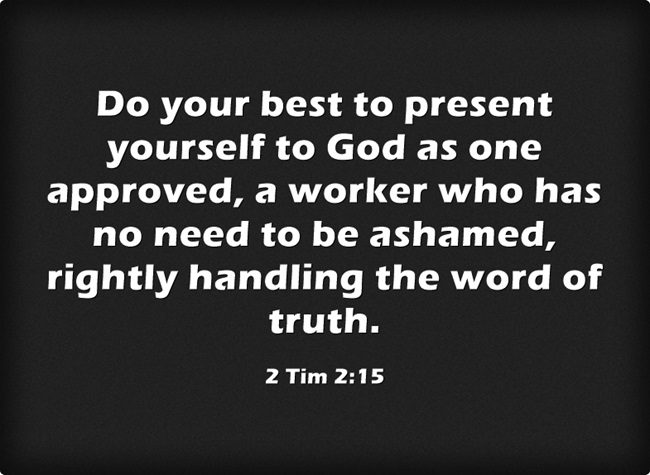What things can you do to help you study the Bible better?
Praying to the Helper
Just before Jesus was about to go to the cross to die for our sins and take upon Himself the wrath of God, He said that He would send a Helper. Jesus said “the Helper, the Holy Spirit, whom the Father will send in my name, he will teach you all things and bring to your remembrance all that I have said to you” (John 14:26). Very shortly He says “I will ask the Father, and he will give you another Helper, to be with you forever, even the Spirit of truth, whom the world cannot receive, because it neither sees him nor knows him. You know him, for he dwells with you and will be in you” (John 14:16-17). Paul adds, “In the same way, the Spirit helps us in our weakness” (Rom 8:26). The Apostle John writes of the Holy Spirit as an “anointing [that] teaches you about all things and as that anointing is real, not counterfeit–just as it has taught you, remain in him” (1st John 2:27). Pray for the Holy Spirit to help you understand what the Bible is saying to you and then ask Him to take that knowledge and see how you can take it for personal application.
A Good Study Bible
I have a few different study Bibles from different authors or editors that help me understand difficult passages. They give insight into areas that I may not fully understand. Of course I treat these as human ideas because although they might be inspiring, they are not inspired. Inspired by God that is. Perhaps the authors were inspired by the Spirit of God to write the notes you find in study Bibles but again, we can’t take these notes and build a set of doctrines on them. Used together, they can give us a better grasp of verses that are harder to understand. Thankfully, the main things are the plain things but a good study Bible will still give you some good thoughts from other Christians and it’s almost like attending a Bible study with them and you get to read their notes.
Laboring in the Word
Paul told Timothy that he had to work at rightly understanding the Word of God, showing that it just doesn’t happen. It takes work, time, study, prayer, notes. Paul wrote to Timothy to “Do your best to present yourself to God as one approved, a worker who has no need to be ashamed, rightly handling the word of truth” (2nd Tim 2:15). Paul also charged or commanded Timothy “to keep these instructions without partiality, and to do nothing out of favoritism” (1st Tim 5:21). Laboring in the Word is just that; it is labor. It is enriching for sure but it takes diligence to stay in the Word on a daily basis and read it with consistency. If you don’t you are not really studying the Bible, you are simply reading it.
Taking Notes
Some church members wisely take notes during sermons so that they can refer back to them when they study the pastor’s topic. As for me, I keep a notebook and sometimes when I run out of paper, I find scratch paper, and I write down certain verses that are appealing to me, contain a special promise, or are of great comfort to me. I read a portion of Scripture and all of a sudden, I see what its saying or I see something in the paragraph that I never saw before. I love the Gospel of John. It is my favorite gospel but sometimes when I read a verse I see something in it that I never saw before. All of a sudden it’s as clear as crystal. When that happens, I write down the book, chapter, and verse in my notes so I can go back to it later and find cross reference Scriptures to help me find out even more about what I just discovered, but naturally with the aid of the Helper.
Repetitious Learning
There are some teachings in the Bible that are repeated several times. This stresses the importance of it to God because what He repeats is what He highly values. Sometimes it takes a few repetitions before I get it but God is longsuffering and patient with me. One way to understand the Bible better is to choose a book in the Bible and study it for a month or more. Use the Book of Romans or the Gospel of John and see how much you can glean from it each time you re-read it. Keep a separate notebook for each book. Mark the chapters and verses that standout and see how many other similar verses there are that you might have missed. Then take some of those verses that are repeated and memorize them because if they’re often repeated, they are often important.
Topological Study
If you want to find about a certain subject or topic, do a study on it. If you want to find out what all of the Bible verses on mercy were about, seek the index to find out all of the verses that have the word “mercy” in them. Write them all out. See what is common among them or is repeated often (as per the Repetitious Learning method). Is mercy the same thing in the Old Testament as it is in the New? What are the differences and what are the similarities, and what does it mean to you?
Biblical Tools
If you fill your bookshelf with concordances, Bible dictionaries, Bible atlas’s, lexicons, and other such study tools, or download Bible applications on your computer, you’ll be better equipped to study the Bible. To know the setting and circumstances in which a Bible verse is written is to better understand its meaning. The geography, landscape, terrain, accessibility, culture, language, customs, nationalities, and so many other things can significantly impact what is written in Scripture and why.
Conclusion
I would say a great way to study the Bible is to live it out. James wrote “be doers of the word, and not hearers only, deceiving yourselves” (James 1:22). The Christian certainly needs the Spirit of God to open up our eyes and ears to Scripture and to have a good study Bible but they must also labor or work hard in the Word, take notes that are of special interest, learn to memorize the Word, then find a subject or topic you want to know more about and take all of the biblical study tools you have and you too will be , “a worker who has no need to be ashamed, rightly handling the word of truth” (2nd Tim 2:15).
Article by Jack Wellman
Jack Wellman is Pastor of the Mulvane Brethren Church in Mulvane Kansas. Jack is also the Senior Writer at What Christians Want To Know whose mission is to equip, encourage, and energize Christians and to address questions about the believer’s daily walk with God and the Bible. You can follow Jack on Google Plus or check out his book Teaching Children the Gospel available on Amazon.
















